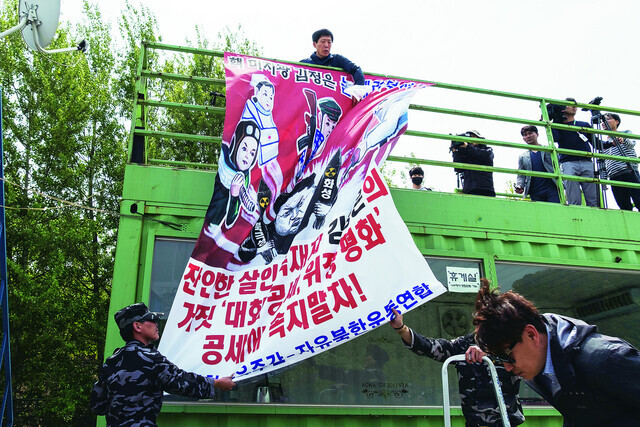hankyoreh
Links to other country sites 다른 나라 사이트 링크
[Editorial] Anti-leaflet law hearing in US can be opportunity for S. Korea to explain its position on anti-N. Korea leaflets

The Tom Lantos Human Rights Commission, a nonpartisan organization in the US Congress, is holding a video conference hearing Thursday over a South Korean law banning the distribution of propaganda leaflets in North Korea.
It’s quite unusual for the US Congress to hold a hearing concerning a South Korean government policy or piece of legislation concerning inter-Korean relations. Instead of responding defensively to the hearing, we hope Seoul will work actively to explain the intent behind its anti-leaflet law and clearly share the kinds of efforts it will be making to improve human rights in the North substantially.
Explaining the background behind its decision to hold the hearing, the commission said on Thursday that some had voiced concerns about the law potentially hampering efforts to improve North Korean human rights.
The anti-leaflet law, which went into effect on March 30, allows for penalties of up to three years in prison and 30 million won (US$26,833) in fines for loudspeaker broadcasting and the scattering of leaflets and other materials in the area around the Military Demarcation Line (MDL).
The Tom Lantos Human Rights Commission is an official organization of the US House of Representatives, and any lawmakers with interest in human rights are free to participate. It is not an official House of Representatives standing committee, so it has no authority to enact legislation.
Conservative media in South Korea and the US have reported that the hearing is being held because US politicians, in general, perceive the anti-leaflet law as a very serious issue. In truth, the event is more akin to a public forum.
The organizers have shared a list of some of the people scheduled to appear as witnesses, including former South Korean Ambassador to Russia Lee In-ho, North Korea Freedom Coalition chair Suzanne Scholte, and Human Rights Watch Asia advocacy director John Sifton.
A look at the lineup gives the impression that it’s skewed in one particular direction. The South Korean government needs to communicate actively with the US Congress so that a more balanced distribution of witnesses appears, including residents of the border region, defectors, and others who have worked to improve North Korean human rights.
If anything, this hearing could be an opportunity to explain to US politicians and human rights groups how much damage border residents are experiencing in their daily life due to these leaflets’ distribution, and how they have to live with fears that an armed clash might erupt.
Experts have stressed that the propaganda leaflets being sent to North Korea do nothing practical to improve North Korean human rights while having severe side effects.
Outside information has been steadily making its way into North Korea through the border with China and other pathways. That influx has actually become more difficult with the leaflet issue, which has prompted North Korean authorities to step up their policing efforts.
Day-to-day life has also reportedly become more dangerous for North Koreans whose family members have defected. Critics have further claimed that the leaflet scattering efforts have devolved into a tactic by certain defector groups to draw support funds from institutions in the US and elsewhere.
The government and civil society in South Korea also need to step up their efforts to bring about human rights improvements in North Korea. They should be showing more interest in the defectors who have settled here while becoming active participants in the international debate on North Korean human rights.
Please direct comments or questions to [english@hani.co.kr]

Editorial・opinion
![[Column] Park Geun-hye déjà vu in Yoon Suk-yeol [Column] Park Geun-hye déjà vu in Yoon Suk-yeol](https://flexible.img.hani.co.kr/flexible/normal/500/300/imgdb/original/2024/0424/651713945113788.jpg) [Column] Park Geun-hye déjà vu in Yoon Suk-yeol
[Column] Park Geun-hye déjà vu in Yoon Suk-yeol![[Editorial] New weight of N. Korea’s nuclear threats makes dialogue all the more urgent [Editorial] New weight of N. Korea’s nuclear threats makes dialogue all the more urgent](https://flexible.img.hani.co.kr/flexible/normal/500/300/imgdb/original/2024/0424/7317139454662664.jpg) [Editorial] New weight of N. Korea’s nuclear threats makes dialogue all the more urgent
[Editorial] New weight of N. Korea’s nuclear threats makes dialogue all the more urgent- [Guest essay] The real reason Korea’s new right wants to dub Rhee a founding father
- [Column] ‘Choson’: Is it time we start referring to N. Korea in its own terms?
- [Editorial] Japan’s rewriting of history with Korea has gone too far
- [Column] The president’s questionable capacity for dialogue
- [Column] Are chaebol firms just pizza pies for families to divvy up as they please?
- [Column] Has Korea, too, crossed the Rubicon on China?
- [Correspondent’s column] In Japan’s alliance with US, echoes of its past alliances with UK
- [Editorial] Does Yoon think the Korean public is wrong?
Most viewed articles
- 1‘We must say no’: Seoul defense chief on Korean, USFK involvement in hypothetical Taiwan crisis
- 2‘Weddingflation’ breaks the bank for Korean couples-to-be
- 3[Reportage] On US campuses, student risk arrest as they call for divestment from Israel
- 4[Column] Park Geun-hye déjà vu in Yoon Suk-yeol
- 5Amnesty notes ‘erosion’ of freedom of expression in Korea in annual human rights report
- 6Korea sees more deaths than births for 52nd consecutive month in February
- 7N. Korean delegation’s trip to Iran shows how Pyongyang is leveraging ties with Moscow
- 8Will NewJeans end up collateral damage in internal feud at K-pop juggernaut Hybe?
- 9[Guest essay] The real reason Korea’s new right wants to dub Rhee a founding father
- 10N. Korean hackers breached 10 defense contractors in South for months, police say